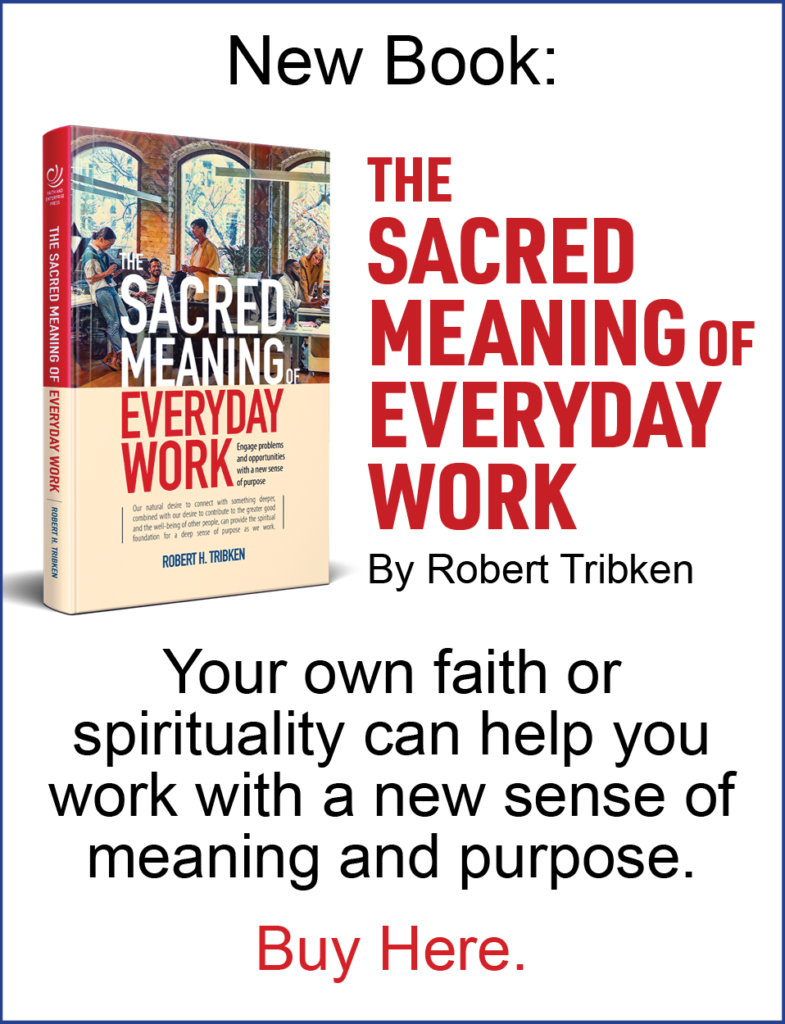In her 1942 essay “Why Work?” Dorothy Sayers made a strong case that we should not undertake work for the money it provides but for the sake of the work itself.[1]
Sayers (1893 – 1957), as you might know, was an English crime novelist, poet, and playwright and was quite popular in the early to middle 20th century. She is well known for her character Lord Peter Whimsy, a fictional amateur detective. She also wrote on theology; the “Why Work” essay was included in her book Letters to a Diminished Church.
Sayers Called For A Revolution in Our Attitude Towards Work
Sayers called for a “thoroughgoing revolution in our whole attitude to work.” Her main point was that we should see work:
not as a necessary drudgery to be undergone for the purpose of making money, but as a way of life in which the nature of man should find its proper exercise and delight and so fulfill itself to the glory of God. That it should, in fact, be thought of as a creative activity undertaken for the love of the work itself; and that man, made in God’s image, should make things, as God makes them, for the sake of doing well a thing that is well worth doing.[2]
We should not think of work as “a thing one does to live, but the thing one lives to do.”[3]
It should express our full talents and abilities and be a source of fulfillment and purpose as we build and create. We should do it well for its own sake and not for the extrinsic rewards it brings us.
Sayers’ point is closely related to intrinsic motivation, in other words, work that one wants to do for its own sake. Beginning in the 1990s, for example, psychologist and current Harvard Business School professor Teresa Amabile developed solid evidence that people tend to be happier, more creative, and more productive when they are motivated by the intrinsic value in their work, as opposed to when they are motivated primarily by extrinsic factors like monetary incentives or the promise of promotion.[4] Other researchers have confirmed and expanded on Amabile’s point.
If we reflect on our own experience at work, I think most of us will be able to spot the difference intrinsic value makes.
Sayers wrote her essay during the Second World War and feared that after the war, people would abandon their newfound devotion to a larger purpose (defeating the Nazis) and return to wasteful consumer spending. She believed they would be encouraged to do so to keep the demand for labor high. She was concerned that, as a result, people would return to seeing their labor primarily as a way to earn money for consumer goods and neglect the value of the work itself.
She went on to argue that preventing this would require a significant change in attitude:
The habit of thinking about work as something one does to make money is so ingrained in us that we can scarcely imagine what a revolutionary change it would be to think about it instead in terms of the work done.[5]
Sayers’s main point applies today as much as when she first wrote the essay. Our work could be richer, more fulfilling, and probably more productive if we allowed ourselves to be inspired by it.
But she also made two secondary points that are open to challenge. First, she criticized those who, after providing for their basic needs, still work primarily for money. And second, she objected to intentionally trying to serve the community through our work. While there is at least some truth to what she says, in both cases, I think she mostly misses the mark.
Is Money a Valid Motivation for Work?
Sayers took as a given that people should be reasonably compensated for their work, by which I would guess she meant they should be paid what we would call a living wage. Beyond this, however, she did not seem to see money as a proper motivation for work. She saw work done for money as being motivated primarily by shallow, wasteful consumerism in pursuit of stylish non-necessities and false social status. And we can certainly point to examples of wasteful consumer spending that seem to have these characteristics, at least from an outside perspective.
But this is only part of the story, and I would say a relatively small part. For many people, the money for which they work so hard means a better life for their children, the ability to live in a less crowded home or a safer neighborhood, a more secure retirement, or an opportunity to pursue important personal goals outside of work. We have each seen exceptions, but even people who seem to be relatively well-off often spend the most significant portions of their budget on items like better housing, their children’s education, hospitality and social activities, maybe intellectual or cultural stimulation, and a chance to experience a more relaxing or rejuvenating vacation. I might choose differently, given the opportunity, but our different values and desires are part of what makes a free society interesting.
Material well-being, which is what working for money means to most people engaged in it, often gets a bum rap in intellectual and religious circles. We can indeed find examples that reflect the caricatures often presented by critics of markets. But if we look closely, I think these examples represent relatively small aspects of most people’s purchasing behavior. It might have been different in pre-war Britain during the thirties, but I doubt it.
Ignore the Customer?
Sayers also seemed to take a dim view of work done primarily to serve the community, by which she usually seems to mean customers. We see this in comments such as “if you set out to serve the community, you probably end up merely filling public demand—and you might not even do that“[6] and “there is, in fact, a paradox about working to serve the community, and it is this: that to aim directly at serving the community is to falsify the work; the only way to serve the community is to forget the community to serve the work.”[7] She seemed to think our work should not take into account the needs and wants of others.
We should certainly work with excellence and be true to our craft. But she goes too far when she suggests that we should ignore the people benefiting from the goods and services our work provides. I believe she misunderstands the fundamental nature of most work.
Work that creates value, whether for ourselves or others, is usually highly collaborative. The collaboration can be between the people doing the work, but in many cases, it is also between the people doing the work and their customers. This collaboration might be indirect and channeled through a complex system of intermediaries and marketplaces, but much of the value of our work is nevertheless created, or at least enhanced, by communication between producers and users. This collaboration can involve the broad goals (make a good table) and the details (make a table of a particular size, shape, and style).
As Michael Novak put it:
It is becoming clearer every day that one person’s work is naturally interrelated with the work of others. More than ever, work is work with others and work for others. Nearly all work is a matter of doing something for someone else.[8]
There might be exceptions—some novelists, playwrights, poets, and inventors, for example—where the worker’s mission is to bring forth their unique vision while resisting outside influences. I would guess Sayers’ work fell into this category, at least to some extent, though I would also guess that while writing, she was mindful of how readers would understand and react to her words and tailored them accordingly. She probably thought carefully about when and how to introduce characters and events, considering the probable effect on her readers.
People who do their best work without feedback from others are the exceptions. In most work, collaboration and feedback from the market are essential for creating value. This collaboration and feedback also contribute to the satisfaction we find in our work. Knowing that someone will find our work useful provides much of the meaning and fulfillment we find in it.
Concluding Thoughts
Sayers’ essay continues to inspire those of us who want to rethink our attitudes toward work. Given Sayers’ religious background and her ability to speak to the church, this could be a crucial message for churches that want to minister to people in the workplace.
I would not leave it at that, however, despite the importance I place on her main message. We also need to affirm the value of work done for other valid reasons—such as work motivated by the material and cultural well-being of our families and by the contribution it makes to the greater good and the well-being of other people.
(Republished April 2, 2023; earlier publication 2018)
[1]Dorothy Sayers, “Why Work?” in Letters to a Diminished Church: Passionate Arguments for the Relevance of Christian Doctrine(Nashville: Thomas Nelson, 2004), p. 1.
[2]Sayers, p. 1.
[3]I believe that by “worker” Sayers is not referring to a member of an economic or social class but to someone who works. In any case, the latter is the way I understand and am using the term.
[4] Cf: Teresa M. Amabile, “A Model of Creativity and Innovation in Organizations” in Research in Organizational Behavior, Vol. 10 (JAI Press, Inc., 1988), pp. 134-137.
[5]Sayers, p 5.
[6]Sayers, p. 12.
[7]Sayers, p. 11.
[8] Michael Novak, Business as a Calling: Work and the Examined Life, (New York: The Free Press. 1996), p. 125.


